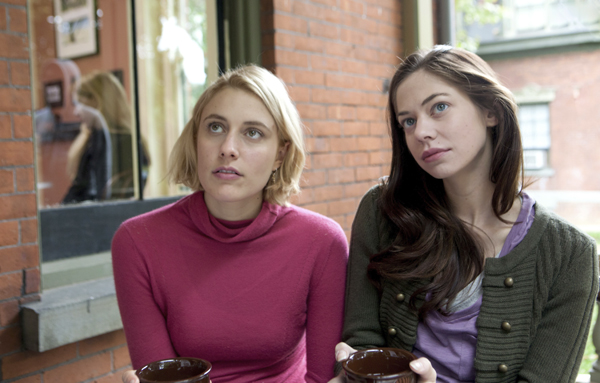Whit Stillman’s first film since 1998’s The Last Days of Disco is an appreciated return to form. “Return” being the operative word. Luckily, this one doesn’t disappoint. Instead, with some of the best dialogue and the most surprisingly complex relationships I’ve seen in quite some time, it quickly reminds us of a time when writer/directors were writers first. Damsels in Distress is cut from the same cloth as Stillman’s earlier films, favoring sharp conversations over complicated visuals. Intelligent, memorable characters are at their wordiness, delivering line after line of juicy bon mots and finding themselves perpetually stuck in endearingly complicated relationship crises.
“Speaking of suicide,” says Heather (Carrie MacLemore), “Do you have a boyfriend?” She sits in solidarity with her fellow co-founders of Seven Oaks College’s Suicide Prevention Center: Violet (Greta Gerwig), Rose (Megalyn Echikunwoke), and Lily (Analeigh Tipton). Stillman offers a world in which having a boyfriend is the primary defense against depression. The girls are a tight-knit band of do-gooder undergrads that room together in side by side bunks at their newly co-ed liberal arts college. From that great philosophical crucible that is a women’s dormitory, they tackle gloomy dispositions—more often than not their own— and observe the various emotional mayhems around campus.
Gerwig’s perfectly rendered Violet is the natural leader of the group, administering her duties well until the inevitable happens: heartbreak! Yes, it happens to the best of us. Violet, no exception, finds that her own boyfriend has ironically found affection in the arms of one of the group’s signature suicide rescues, Priss (Caitlin Fitzgerald). The girls must continue, somehow, to pick their way through the continual wreckage of this and other woes.
With the ethical standards of a 1960’s housewife in the form of a modern day 19-year-old, Gerwig proves she’s going to remain a relevant talent for a very long time. Make a note, she might be owed an Academy Award in 15 years when her actual years catch up with the sophistication she shows in this film. A close second is former America’s Top Model finalist Analeigh Tipton, who is not only strikingly beautiful as Lily, but brings a subtle, and necessary, outsider’s perspective to her scenes, and allows the audience an even richer grasp of the story. Violet and Lily are also the smart, active central female characters too often missing in Hollywood, yet it’s easy to forget this important point when watching such an entertaining film.
This is a testament to Gerwig’s and Tipton’s work, but also to the brilliance of Stillman’s spot-on script. He succeeds not only with consistently funny scenes but also with his downright affection for the characters—the witty and self-effacing humor recalls the best of a previous generation’s writers, such as Woody Allen, and deftly avoids the schlocky trappings of other campus comedies, like National Lampoon’s Animal House. Entitled sorority girls and comically dense frat boys (Stillman sardonically renames fraternity row the “roman letter houses”) aren’t necessarily a sympathetic group, but rarely will you see a script that is so successful at making you like a bunch of characters you didn’t expect to. Even otherwise despicable types are given a fair shake—Xavier (Gossip Girl’s Hugo Becker), whose religious beliefs supposedly won’t allow him to have “procreative sex,” that is “sex from the front;” Fred (Adam Brody), who convinces women he’s no college student but instead a successful businessman named Charlie; and even the exceptionally dim Thor (Billy Magnussen), who finally learns the names of all the colors.
What better way to end the film than with an elaborate dance number involving everyone in the cast. It’s a funny, beautiful little way to point out just what Stillman is getting at here. This is a film about the encircling passions of young people making their way in the world. What seemed a world-ending event yesterday is often a mere blip on the human timeline. Stillman, I suppose, is an optimist, a filmmaker that believes in something good within each person that populates his world. Damsels gives back in sympathy what it takes out in lampoon, something few comedies seem to be able to do. On screen, this isn’t as sappy as it sounds, trust me.







Leave A Comment